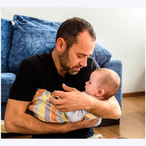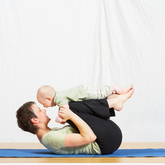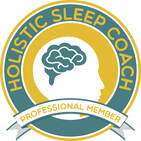Welcome to Remy's
|
|
Booking call - 21th October 2021
|
|
|
|
Quick wins.
You can print it by clicking on each picture. |
Week 2This week we will work on:
As expected, with more sleep in the day Remy is now able to stay awake for longer in the evening and we can adjust his bedtime. You are right that he seems to need around 10 hours of sleep in the night, so let's work with that.
This week's work is around the end of the day!
Your bedtime routine is really good but we can adjust a little to better suit a growing baby. Consider adding another element or two (perhaps a massage and a book?). On the video below you can find detailed information about bedtime routine.
And here are the main points on the video with suggestions for your family: The point of the bedtime routine is to give a predictable and soothing end to the day that is positive, reassuring and familiar. The bedtime from a child’s perspective – This is the time of preparing for separation. Consistent bedtime routine is key! Here are the three most important elements of a fantastic bedtime routine 1 -- It needs to have a predictable rhythm: Think of having 3 or 4 elements you do before bedtime -- Every single day and in the same order -- (as much as possible) . What you are already doing is lovely - a wash, into pyjama/sleeping bag, Brahms lullaby, dark room and pink noise, bottle, rocking. We can see there are some changes in environment and a couple of 'getting ready' elements, but most of the connecting and calming is coming from the bottle and rocking (and sometimes from extra breastfeed). The objective of the bedtime routine is to repeat that predictable rhythm and to fill your child’s love tank so you need to add one or two short elements that are connecting. Often there is a misunderstanding about the function of the bedtime routine. It is important to have a bedtime routine and before that, a period of winding down. These two are separate happenings that take place before sleep. The function of the bedtime routine is to create a feeling of connection and safety. Babies also need to wind down ahead of the bedtime routine. A short version of winding down and the bedtime routine is also to be used before naps to recreate the little ritual before sleep. If Remy is very tired, then skip all preparations and just help him to sleep quickly. The winding down are few activities before the bed time routine. Perhaps a fun but brief tickle fight to release energy followed by a feed to chill and calm. This is a time you are managing the environment - making it calmer in preparation for sleep. Up to 30 minutes ahead of starting the bedtime routine should be enough. Now that Remy is able to stay awake for longer after dinner, you have time to introduce a brief wind down time. 2 -- It needs to be not too long and not too short: If it is too long, he will loose focus and start playing and being distracted again. If it is too short, he will just not have enough time to fill that love tank. For babies Remy's age, the routine might be lasting around 30 minutes. 3 -- It needs to be calming and reassuring: So YOU need to be calm and in a good place of mind. Get prepared! In a practical and in a mental way.
Be consistent with the bedtime routine: do the same things in the same order, every night!
In order to help Remy to fall asleep with other ways besides constant close contact or movement, first wee need to layer new sleep cues to later shift away from the close contact and movement. This is called habit stacking and is the most gentle way to shift the input at sleep time.
So, from this week, every time you are helping Remy to sleep add shushing and patting (or anything else that works for you) at the same time that you contact nap or feed him to sleep. If you are out for a walk, then don't worry about it! Nap and bedtime timing adjustmentsYou have done some great work with the naps this last week! This week, focus on the distribution of naps:
Wake up at 6am nap 1 at 8am (he seems to sleep for around 2 hours) nap 2 at 12:30pm (sleeps for around 30 min) nap 3 at 3:30pm (sleeps for 1 hour) bedtime at 7:30pm Bedtime Now that Remy is sleeping more in the day, wee need to adjust the bedtime. The bedtime will be determined roughly by the distribution of naps. I would suggest a later bedtime, closer to 7:30pm. |
Week 3There has been a lot happening in your lives this past week, with moving to England. Therefore, this week I suggest you to continue working on the points form last week - with a few extra details. Tasks for this week
At bedtime routine, I suggest you add one or two elements that are connecting. At the moment this function is fulfilled by the feeding and cuddles (nothing wrong with that). Remember to end the routine with something that is also calming. Here are a few ideas for you to try that may work for Remy:
Week 4
Play ideas
It will be helpful to have organised pauses to lower the energy levels from time to time. Stopping contact napping One of your goals was to promote independent sleep for Remy. So below you can find a way of doing that. Start from whichever phase you are at and remember to keep moving forwards! Little, but constant steps! At first practice this during the day, and you can also start doing it at night. Remember that any changes you make at night, very likely will at first give you less sleep. But later it will bring you more and longer sleep. The idea is to increase Remy’s confidence in sleeping with less contact. Phase 1: Separating the feeding from sleeping
Phase 2: Implementing Constant Presence
Week 5We are approaching the end of our time together and you have achieved 2 out of your 3 goals. This week I'd suggest you
If you decide that making changes to the contact naps and the nights are a priority, then you will find suggestions on how to proceed bellow. I also wanted to share with you a few videos and information on topics we briefly talked about on our last call. |
|
Some information on attachment, emotional regulation, rupture and repair and the wonderful job you are doing as a parent
I think this is what we were briefly talking about, in terms of attachment etc How to help children regulate their emotions https://www.youtube.com/watch?v=fJXsyUexs30 From 1min 10sec the speaker talks about what is happening in the first year. Rupture and repair is hugely important for the emotional development of babies. It is not expected that parents will always get it right or that babies will never get stressed. Here is a short video on this https://www.youtube.com/watch?v=cbfuBex-3jE&t=1s I really don’t want to minimise the effects of toxic stress on brain development, but often there is a too rough generalization on what is actually happening. Basically, some stress is fine and actually important to build resilience, but too much stress or being too much stressed alone can be a problem. So you see, there is a difference here. Also, another important and protective factor is the buffering effect that responsive parents have on the child’s stress intake. Here is a short article on this https://developingchild.harvard.edu/science/key-concepts/toxic-stress/ There is also the talk bellow about mentalization and from 9 minutes the speaker talks about quality time and the need for parents to help their children to solve their problems https://www.youtube.com/watch?v=MJ1Y9zw-n7U So our job as a parent is not to create a world for our children that has no stress or problems. Instead, our job is to help them with their problems. It is also expected, from a neurobiological perspective, that we WILL get it wrong sometimes and that we won’t always be able to immediately solve all of their problems, but helping and being with them through it is enough to build positive relationships, positive brain connections and resiliency. So, bringing it to you and Remy…. You are doing so amazing at all this! You’ve been there for Remy so much and now that he is entering the older baby stage, you are adapting and changing to his new needs. Helping him to learn new ways to fall asleep (the patting, shushing etc) is not going to be easy for Remy, but you and Chris are there through it all.
So now you just need to show Remy and practice together with other ways to fall asleep - trust he can do it! These new ways may be waiting to see if he settles himself in his active way, or with Chris doing one of the wakeups, or by you doing the step-by-step suggested last week (to stop the contact nap). It may be helpful for you and Chris to decide when you are going to do each of these. For example:
If you were to try the bedtime nap, here is a suggestion:
This will be a late bedtime that in time will become earlier but not as early as now. We will then observe what Remy does and if it helps him sleep for longer stretches at night and needing less input. Please note it will likely take a few nights to settle and for us to see if it works or not (it usually does) The other thought from our conversation I wanted to pick up on was that Remy WILL NOT have the contact naps for ever. I can guarantee it eventually will stop, but it may take a long while. So you need to think what you want to do now: Do you want to carry on with both contact naps? Do you want to carry on with the morning contact nap and actively work on the 2nd nap? Do you want to stop both contact naps? Once you have decided and committed to one of these that take action (or not if you chose the first option). Be consistent in working on the naps that you decided and keep taking small steps forward (follow the suggestion from last week). Changes will only happen if you change things Final weekSo much has happened in your lives and in terms of baby development whilst we have worked together. There were lots of ups and downs but you managed to make progress nevertheless. On this last week, I want to remind you on the steps you have been working on, and should continue to work on, to achieve your goals. I also want to send you some final suggestions and details on how to encourage Remy to fall asleep with less intense support and a few other suggestions related to eating food, naps averages, portion size and average amount of milk and a few ideas to improve your own sleep. |
|
Here are the 4 points to focus on to see changes in sleep:
Naps There has been some great improvements here, and now, sometimes Remy is having 2 hours long naps. To further adjust the naps in a way that gives you more flexibility, you could explore with timings and durations of naps. Whenever you try something new, keep doing it for 3 - 5 days to see if it works or not. Here goes a suggestion. All nap timings have a 30 minutes grace time:
Here goes a second suggestion. Perhaps a controversial one as Remy didn't use to like a later nap, but it may work better now:
When you go out in the afternoon, you could encourage3 shorter naps in the afternoon and/or an earlier bedtime. Having 3 shorter naps in the afternoon gives you more flexibility for Remy to sleep in the carrier. The other way to get more flexibility is by continuing practicing sleeping on his own. Here are the averages amount of sleep and nap gaps for this age and up to 1 year. Please use the timings above and below as a guide only. It is a lot more important that you are guided by your knowledge of Remy (for example when you said you think he can stay awake for longer now) Age Nap Gap Total naps 6 – 7 months 2 – 3 hours (often 3 nap) 3 - 4 hours 7 – 8 months 2.25 – 3 hours (often 3 naps) around 3 hours 8 – 10 months 2.5 – 3.5 hours (often 2 -3 naps) 2 - 3 hours 10 – 12 months 3 – 4 hours ( often 2 naps) around 2 hours Stopping contact napping - See step by step on week 4 Remember to keep moving forward and make sure every few days you are on a different step, with a little less input to help Remy fall asleep. NightsUse the same steps you are using during the naps, but at night. Remy needs to find new ways to fall asleep and the above steps will get you there. Here are a few different ways to approach the nights depending on how quickly you'd like to see results: The slow and gentle way (making changes just early in the night)
The mid speed way (making changes at bedtime and a few hours more)
The fast way This is the most efficient way to make changes to sleep, but it is likely to result in some exhausting nights for you. If you choose this option, make sure you can catch up with some sleep the next day during the daytime.
Any wake up before 6am, treat as a night awake: quiet interaction, dark room, remain in the bedroom. You could offer a feed before you go to bed and at around 3 am, at a time he is usually waking up. A lot of people will start with a more gentle way and then move on to a faster way. Feel free to change speed as you need, but Try and stay on each of them for at least 2 days. Too much swap and change makes babies very confused and more jumpy. Nutrition
It would be great if you could encourage most of Remy's calories to be taken during the day. Milk still is the main source of calories but as Remy approaches 1 year old, this balance will start changing.
Here is good and reliable source of information and you will find pictures on portion size, tips for "fussy" eating and loads of recipes.
Recipes with photos of portion sizes from page 56
Size of plates on page 120 Here you will find more information on helping Remy eat better and they advice babies Remy's age should have around 600ml of formula per day (but be let by your baby). This is easily achieved with breast milk before naps and after meals as well as 2 or 3 night feeds. Dear Sarah and Christopher It was great working with you in the last month. You have made some good progress with Remy's sleep situation through hard work and some consistency. I hope you can find some time to celebrate your achievements! What were your goals? Your main goals were:
Remy had many ups and downs, feeling unwell, moving country and then house... but even with all these factors that unsettle sleep, you have achieved 2 out of the three goals and you are working on the third goal. For you to achieve all your goals, It is important that you work as consistently as possible on moving forward towards independent sleep and keeping to a predictable rhythm to Remy's day. This had been difficult to achieve as you are at a stage in life with so many changes, and that is ok. By setting some rhythms to your day and by practicing falling asleep with less of your help and presence you provide Remy with the reassurance that he can do it. Patience and consistence is key! I also believe Remy really does need some extra support from time to time when he is experiencing something new. Remy seems to be the best of both: physical and happy, and also sensitive to the environment. This is a great trait mix but it also means he needs extra support from time to time to be able to better manage and process all the changes. As you know, this is really hard work as sleep is the first thing that suffers during these phases. You are doing a fantastic job in supporting Remy's development in a responsive and fun way! It has been a pleasure going through these weeks with you and seeing the improvements emerge when life has let you follow the plan ( so much going on for you - you really are doing great!). I hope you found the program has helped you all to understand Remy's sleep needs better and to develop some tools you can use for the times ahead.
As Remy grows and his sleep changes, if you need further support I offer a one-off video call a weekly support for past clients. Here is the link for more information https://www.calm-sleep.com/services.html Lastly, I would be very grateful if you could share a review here and/or email any feedback that will make the service better for future parents. All the best Karina | ||||





